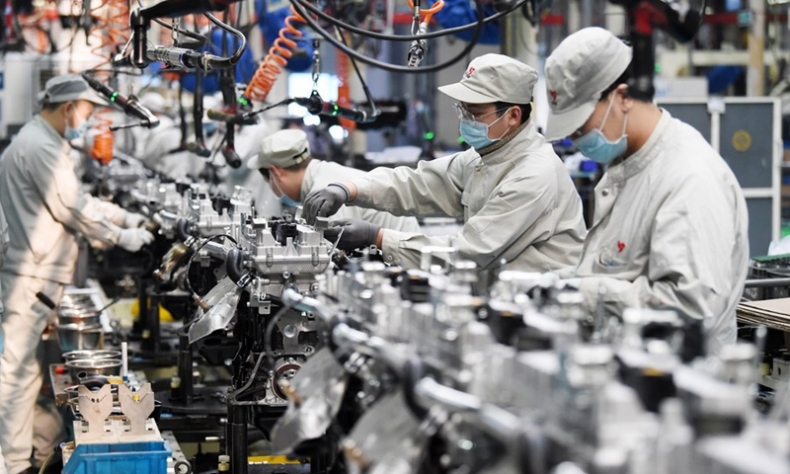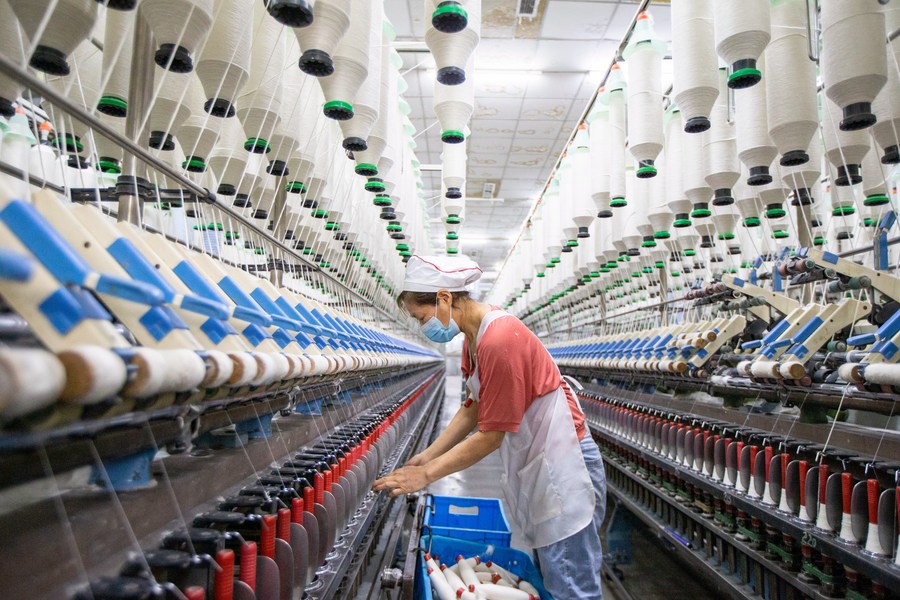China Ramps up Support for Private Businesses

Central authorities have been reiterating the stance on providing an enabling environment for private enterprises and facilitating their growth to revitalize the economy.
Mizhi, a county in the northwestern province of Shaanxi, has been hailed as “the county of beauty.” Folktales tell it is the birthplace of Diao Chan, a woman considered one of the four great beauties of ancient China. Located on the Loess Plateau, Mizhi has natural climate and soil advantages for growing millet, one of the oldest cultivated grains in the world. The millet that grows there is of a higher quality, which is reputedly the secret to local women’s good skin.
Despite the beautiful tale, Mizhi farmers have, in the past, been unable to find a market for their millet due to a lack of visibility. However, the emergence of e-commerce is helping them secure livelihoods from the crop. “The purchasing price of local millet was 1.6-1.8 yuan ($0.23-0.26) per jin (500 grams) in 2016, when I started the business,” Zhang Xiongbiao, founding General Manager of the Shaanxi Young Entrepreneurs League E-Commerce Co. Ltd., told Beijing Review. “The price has now doubled.”
Zhang started his business together with another 20 local young people, signing exclusive agreements with growers to purchase their millet and sell it through online channels. After years of effort by Zhang’s team, their brand, Mizhi Taohuanao Millet, has become well-known on major e-commerce and short video platforms. This has even led to people from Mizhi’s surrounding areas embracing millet cultivation as well. To date, Zhang’s business has provided more than 6,000 households of growers with livelihoods, helping them increase their income and escape poverty.
Private businesses like Zhang’s, which make up 90 percent of the number of market entities nationwide, have been playing an indispensable role in all aspects of China’s social and economic development. They currently contribute more than 50 percent of the country’s tax revenue, 60 percent of its GDP, 70 percent of technological innovation and 80 percent of urban employment.
“The private sector is the source of vitality for China’s economic development,” Yang Yiqing, Deputy Director of Zhejiang Businessman Research Institute, a think tank under Zhejiang Gongshang University, told Beijing Review. “To a great extent, it determines the growth potential of employment and consumption and further drives up the economy.”
“At present, the most important thing is to lift market access restrictions on private investment and shore up the confidence of entrepreneurs to tide them over difficulties caused by the COVID-19 pandemic and shrinking exports and consumption,” Yang said.
Central authorities have been reiterating the stance on providing an enabling environment for private enterprises and facilitating their growth to revitalize the economy.

Overcoming challenges
It’s never easy for private entrepreneurs to pursue careers. Zhang still remembers how hard it was to purchase new millet from growers in the first year of his company. “They were unwilling to sell new harvests as the millet of previous years remained unsold,” he said. Worse still, Zhang, previously a designer, knew little about e-commerce and had to start from scratch. Even his offices were offered for free by the government at an e-commerce industrial park.
Things got better as e-commerce began to take off around the nation. The sector also received a boost from the government for its significant role in alleviating poverty and rural revitalization. Particularly, numerous live-commerce events on major e-commerce platforms and surging media reports have increased exposure for more agricultural product brands. Zhang has ridden the momentum and seized the opportunities as they have come along.
Then came the COVID-19 pandemic. Many places imposed movement restrictions to curb the spread of the virus, but they severely disrupted the nation’s logistics industry. “Some customers were unwilling to wait for extended delivery times. They canceled their orders or returned the goods for refunds and the extra delivery fees increased our costs and placed pressure on cash flow. We also had difficulties hiring new employees due to the restrictions,” Zhang said, adding he had to cancel major promotional campaigns.
Jin Lijian has experienced his share of troubles as well. “We picked up our first employees from the roadside,” the CEO of ShadowBot joked. Established in 2019 in Hangzhou, Zhejiang Province, ShadowBot develops robot software that can simulate human operations and perform repetitive online tasks such as mouse clicks, keyboard input and reading information, enabling enterprises to improve efficiency. “It’s hard for a startup to hire people in its early stages because potential employees have concerns about how long it will survive.”
“The first person I employed had been jobless for a long time at that point and he asked me whether I could pay him in advance because he had no money in his pocket,” Jin told Beijing Review.
Jin said the pandemic forced his company to grow. “During the pandemic, investors needed to resort to online methods for communication and due investigation, so they became more cautious,” Jin said. Facing cash flow pressures, Jin decided to launch a paid version of his product with more powerful functions, while continuing services for users of the previous free version.
It was the first time for the engineer-turned-entrepreneur to take on the role of salesperson. Fortunately, the excellent performance of the paid version won over customers and helped ShadowBot attract the attention of large investors such as Hillhouse Capital, Goldman Sachs and Tencent. So far, they have invested $200 million in the company.

Soil of growth
Guo Wenhai, Secretary of the Communist Party of China (CPC) Zhongshan City Committee, made public his personal cellphone number at a local conference on high-quality development on January 28. Zhongshan is a major manufacturing hub in Guangdong Province and has a thriving private economy. “Entrepreneurs who need assistance with business expansion, investment or construction of business spaces can contact me directly,” he said, pledging to provide whatever help he could—within his capacity.
Governments at all levels have put the development of the private economy at the top of their agendas. Since China eased its COVID-19 restrictions in early December 2022, some local governments have chartered flights for private business representatives to travel abroad and drum up more export orders.
Central authorities continued to send positive signals, emphasizing the need to consolidate and develop the public sector of the economy, and at the same time encourage, support and guide the development of private enterprises.
The Central Economic Work Conference in December 2022, which outlined priorities for the government’s economic work in 2023, underlined law-based protection of the property rights of private enterprises and the interests of entrepreneurs.
Despite these advances, discussions on the relationship between government and private companies continue. China’s efforts to regulate market order, such as rectifying the chaos of the Internet and education industries, were misinterpreted by some as a crackdown on the private sector.
Yang believes “the dynamic balance between development and regulation is an art” and that pacing development is like riding a bicycle: Too fast is risky but too slow makes it easy to fall over.
“With clear and detailed rules and regulations, the government needs to create a law-based business environment, and enterprises should operate according to law,” Song Xiangqing, Director of the Research Center for Industrial Economy at Beijing Normal University, told Beijing Review.
Zhang said policy support is essential for corporate growth. He said his company had enjoyed tax deductions and reductions of more than 1 million yuan ($146,436) since its establishment. County leaders have made guest appearances on his live-stream events to introduce local agricultural products to consumers.

Future prospects
Inspired by positive policy signals and optimized COVID-19 response measures, Zhang shows strong confidence toward the future.
“Our e-commerce business centered solely on millet sales at the beginning, but now we have set up a millet primary processing base and our own logistics networks,” he said. His company now has a 50,000-square-meter factory and its revenue has surpassed 100 million yuan ($14.6 million) in total. He has invested 120 million yuan ($17.6 million) in infrastructure construction and upgrading, which will go into operation by mid-2023.
“We’re able to expand business activities and people are tending to consume more as pandemic controls have been eased, which indicates bright prospects,” Zhang said.
Jin believes concentration, patience and a long-term outlook are important attributes for entrepreneurs. He said when the financing environment is sub-optimal, impetuous companies tend to be knocked out. Jin had a simple reason to start his company: Similar products on the market weren’t good enough and he could produce a better one. With this firm belief, Jin’s company has survived and thrived.
He spoke highly of ChatGPT, an artificial intelligence-based chatbot developed by U.S. tech company OpenAI, saying it required extreme concentration and patience on the part of the development team to devote itself to research and development for years without seeing any profits. “That’s what we, Chinese entrepreneurs, need to learn,” Jin said.
China has a great environment for the software industry, according to Jin. “We have the best possible engineers and some of the most diligent employees in the world,” he said, adding he’s going to improve his product.
He expects one day ShadowBot robot software will go overseas and serve more users. “That will be the happiest moment I could ever imagine,” Jin concluded.
 Facebook
Facebook
 Twitter
Twitter
 Linkedin
Linkedin
 Google +
Google +










